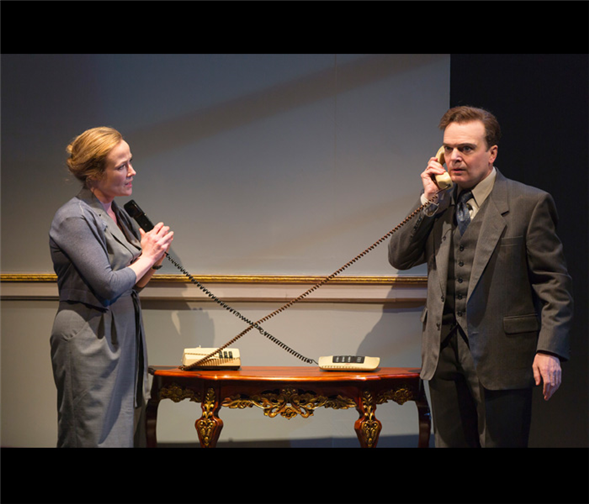Translate Page

J.T. Rogers blends facts and fiction about the Oslo Accords
---
Playwright J.T. Rogers practically specializes in turning major political events into compelling stage dramas. He's done it with the genocide in Rwanda in the 90s (The Overwhelming) and the Soviet occupation of Afghanistan in the 80s (Blood and Gifts). But while it continues this thematic approach, his latest play Oslo presented some daunting new challenges.
The show, which is now at Lincoln Center Theater, tracks the back-channel negotiations between the Israelis and the Palestinians that resulted in the 1993 Oslo Accords, where each side officially recognized the other for the first time. Many of the characters – including the Norwegian diplomat Terje Rød-Larsen and the Israeli diplomat Uri Savir – are actual people, and dramatizing them pushed Rogers into new territory. Though his previous historical works were inspired by true events, they relied on fictional characters.
"It's a unique experience because everyone in the play is a real person living or dead, but is completely imagined by me," the playwright says. "Even the scenes that hew very close to reality are all pitched to a different theatrical level."
Rogers got the idea for Oslo three years ago when he met Rød-Larsen, who told him how he and his wife Mona Juul, then an official in Norway's Foreign Ministry, hosted the secret meetings that eventually lead to the famous photo of Yitzhak Rabin and Yasser Arafat shaking hands at the White House.
Intrigued, Rogers started reading memoirs, histories, and news accounts about the events surrounding the negotiations. He discovered several tidbits that made it into his script, such as how the participants on both sides shared a fondness for Johnnie Walker Black and the waffles made by the woman who cooked for them during their talks.
{Image1}
He also learned that two German tourists wandered into the proceedings, unaware their room reservations had been canceled at the castle where the meetings were held. This gives the play a moment of levity, while on the more serious side, the fact that two of the negotiators had beloved daughters named Maya underscores the personal stakes for all involved. "You can't make this stuff up," Rogers says. "A writer working from complete fiction would never get away with it."
He also conducted extensive interviews with many of the main players, including Larson and Juul, to get a sense of how they thought and talked. He eventually worried, though, that too much attention to the details of what actually happened might inhibit the theatrical narrative he needed to create. So Rogers cut off conversation with the couple for about 10 months, which liberated him to imagine the fictionalized version now played by Jefferson Mays and Jennifer Ehle.
"I wanted to pretend that it was just a made-up thing, even while scrupulously trying to hew to the larger facts of it," he explains.
Among the fictional scenes are a volatile game of charades that allows its players to reveal how they truly feel about the conflict and, in what Rogers calls his favorite moment in the play, a climactic moment when Juul gives the recalcitrant negotiators the reasons they need to end their stalemate.
The toughest task, he says, was determining what to leave out. The first preview clocked in at three hours and 45 minutes.
The show has since been trimmed to just under three hours, including two intermissions, but Rogers says the cast members, many of whom bonded with their real-life counterparts through regular phone calls and Skype conversations, only half-jokingly ask, "What's in Act IV?"
---
Follow Janice C. Simpson at @BroadwayAndMe. Follow TDF at @TDFNYC.
Photos by T. Charles Erickson. Top photo: Jennifer Ehle and Jefferson Mays.
TDF Members: Go here to browse our latest discounts for theatre, dance, and concerts.